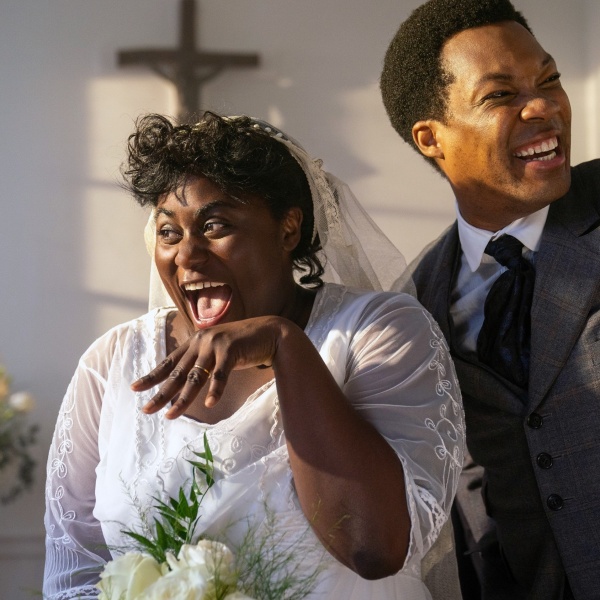
People get excited about a new Tom Hanks movie simply because people fucking love Tom Hanks. He’s both an affable everyman and a huge movie star, and in the performances he leaves on screen, whether it’s a slow-witted American who happens into great moments of history, a gay man living with AIDS, or a modern executive stranded on a sandy desert island, you root for him to succeed, even when he takes missteps (like duplicating himself for a creepy computer animated project or playing the most mild “bad guy” imaginable), because you both love seeing him in the movies and also want to invite him over for dinner.
It’s this built-in goodwill, an inherent likability that Hanks seems to be depending on (both as a performer and as the film‘s director and co-writer) in “Larry Crowne.” But not even his sweetly honed sincerity can save the film from a series of catastrophic miscalculations. You may still want to have him over for dinner, but you’ll probably want to steer clear of this film in conversation (“Dragnet” should probably be taken off the table too).

The film opens with a jaunty title sequence set to Electric Light Orchestra‘s “Hold On Tight” (making “Larry Crowne” the second movie in the last few months, after “Super 8,” to prominently utilize an ELO song) as we’re introduced to the titular character – a lovable schlub who works at a Walmart (or is it Buy-N-Large?)-type superstore. When he’s called into the break room by his superiors, he assumes he’ll be getting his ninth employee of the month award. Instead, he’s being let go of his position, mainly because he failed to go to college (he was in the Navy for 20 years, he quickly points out). Shocked and saddened, he returns home to figure out his life (and his finances). At the urging of a neighbor (Cedric the Entertainer), he signs up for classes at a local community college but for reasons that never really crystallize – does he want to return to his job after earning a degree? Is it a self-empowerment thing? And if he’s so strapped for cash, how is he affording it (community colleges, no matter how low rent, still cost money)?
It’s at this college that he befriends a feisty young student (Gugu Mbatha-Raw) who invites Larry to join her scooter gang and takes a pair of classes – one is taught by an unreasonably chic professor (Julia Roberts) on the subject of public speaking and the other is an economics intro class taught by a guru (George Takei) who runs his class like a feudal lord. Larry brings the same can-do spirit to his classes as he did to the job he was fired from, and it speaks volumes that the film is pretty upfront about its inner cheeriness, unlike movies like “The Company Men,” which try to deal with the recession in deeply dramatic ways before pulling out a happy ending that leaves the audience falsely reassured.
Surrounding the central storyline, which at its heart is an often times agonizingly drawn out romantic comedy between the Roberts’ and Hanks’ characters, are a dozen satellites of characters and subplots, none of which add up to much (if anything). Roberts is in an unhappy marriage to a failed novelist (Bryan Cranston, utterly wasted) who is addicted to — since this is a PG-13-rated movie — the tamest Internet porn you’ve ever seen (some of it looks like the bawdy photos that you’d peer at through naughty nickelodeons). Mbatha-Raw, who is so adorable and charming that she seems to electrify the entire movie ever time she’s on screen, wants to open a thrift shop. Hanks quickly becomes both a whiz in economics and a short-order cook at a local greasy spoon diner. Oh, and occasionally Pam Grier waltzes through the movie as another professor and friend of Roberts’, probably just to remind you of how awesome Pam Grier is.
As stuffed with unnecessary complications as “Larry Crowne” is, it remains a film trapped in amber. It doesn’t know whether it wants to be the kind of messily realistic humanist comedy that Alexander Payne specializes in or a more cartoony style akin to sitcoms like NBC‘s “Community.” Cedric the Entertainer’s character, for example, is supposed to be a sounding board for Larry’s struggle, but he’s so broadly drawn — he’s been living off game show winnings and now oversees a perpetual tag sale in his front yard — that instead of being emotionally involved, you’re simply left wondering what kind of zoning ordinances he’s violating by having this yard sale all the time and why none of the other neighbors have complained.
The movie is rudderless and despite its relatively swift 99 minute running time feels longer than “Roots.” It’s so shapeless, in dramatic terms, so free of both conflict and motivation, that when something even mildly important happens towards the end of the movie, you have to wonder if it’s the climax simply because it’s the only thing that’s really happened in the last twenty minutes. There’s also a heavy reliance on coincidence and happenstance that is absolutely absurd – characters keep running into each other simply “because.” It’s the worst of lazy screenwriting shortcuts and it hurts the movie’s credibility as any kind of realistic, slice-of-life comedy, instead jutting it, once again, into the kind of overblown farce it’s trying so desperately to avoid.
What makes this even more disappointing is that “Larry Crowne” is Tom Hanks’ second feature as a director, after 1996’s outrageously underrated music world comedy “That Thing You Do.” His first film had a number of things that “Larry Crowne” is desperately missing – namely texture, scope, and believable characters that you actually engage with (as well as a thematic and philosophical point-of-view). It was a startlingly assured debut and one that heralded a director who was every bit as talented as he was an actor. His talent behind the camera isn’t all gone. Some of the shots have a painterly beauty – cinematographer Philippe Rousselot turns the background of a megastore into a field of dull pastels – but nothing is ever all that interesting to look at, and it doesn’t help that the whole thing is set to an obtrusively “jazzy” James Newton Howard score spiced up by what feels like four thousand Tom Petty songs. But when you’re watching a movie starring genuine movie stars like Roberts and Hanks (giving rote, overtly mannered performances) and all you’re doing is waiting for the next time George Takei will make an appearance, well, you know something’s deeply wrong. [C-]




